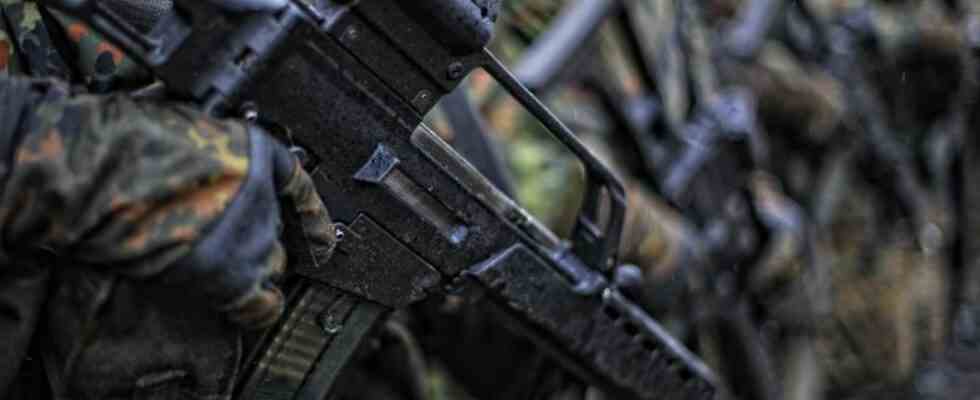armed forces
Naval inspector doesn’t find conscription debate unreasonable
Conscripts in basic training at a military training area. photo
© Peter Steffen/dpa
Like private companies and public employers, the Bundeswehr is also plagued by concerns about recruiting young people. Should conscription be reintroduced?
In the view of Naval Inspector Jan Christian Kaack, the debate about a possible return to conscription in Germany is not a ghost discussion. He had always been a supporter of conscription and was encouraged in his more than two years of work in Norway, said the Vice Admiral of the German Press Agency.
“I believe that a nation that has to become more resilient in these times will have a better understanding if we have a mix with the soldiers,” said Kaack.
In Norway, all young men and women would be screened. That’s about 70,000 a year. The armed forces then defined how many they wanted to take – that was around 15,000 a year. “Whereas we are only discussing how we should accommodate 200,000 young people. That can also be arranged differently.” In Norway nobody talks about military justice. There is a broad consensus that these young people could do something for the state once in their lives.
From 2019 to 2021 Kaack was commander of the NATO Joint Warfare Center in Stavanger (Norway). With regard to the Bundeswehr’s human resources, he said: “I am firmly convinced that, given the expected demographic development, we must broaden the base of those we can apply for. It is a fact that we used to have 70 percent of our dragged long-term servants out of conscription.”
Defense Minister Boris Pistorius (SPD) recently described the suspension of conscription by the black-yellow federal government in 2011 as a mistake. FDP leader Christian Lindner rejected any discussion about a return to conscription and spoke of a ghost discussion.
“The special fund alone will not fix it”
Kaack also commented on the financial framework for the Bundeswehr. The challenges cannot be met without a significant increase in the defense budget. Buying a large weapons system via the 100 billion euro special fund set up last year is important, but it also has to be operated. For this, the individual plan 14 must be increased. “If the defense budget is not increased, then the special fund was a palliative measure,” Kaack warned.
Only the special fund and an increase in the budget would give an overall picture of the desired goal of two percent of gross domestic product – the NATO countries have set themselves the goal of increasing their defense spending to around two percent of economic output in times of peace. “The special fund alone will not fix it,” said Kaack. Quick decisions on research funds are also necessary so that future weapon systems can be developed.
He assumes that the defense budget item, which is currently around 50 billion euros per year, will be increased. “And we make our projects watertight so that they can be picked up immediately when funds can flow,” says the marine inspector, who has been in office for about a year. From the original list of the special fund, some projects in the Navy were put on the waiting list. “I would have liked to have imagined it differently.”

